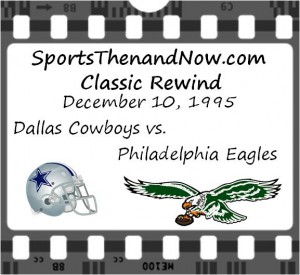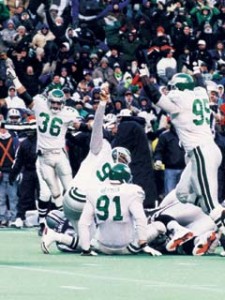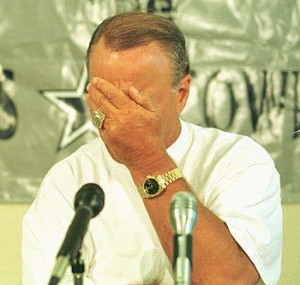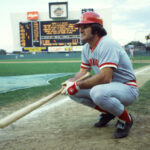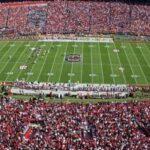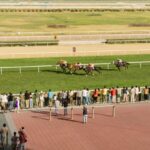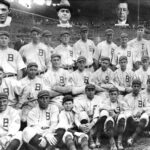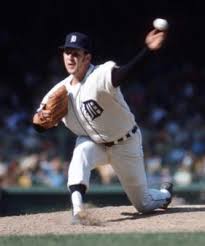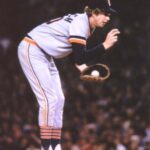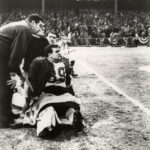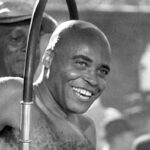Classic Rewind: Eagles Stop Smith and the Cowboys
One of the most memorable moments in the 2009 NFL season was the Indianapolis Colts scoring a last-second touchdown to pull out a 35-34 victory against the New England Patriots after the Patriots were stopped on 4th-and-2 at their own 28-yard-line, despite holding a six-point lead with about two minutes to play.
Patriots head coach Bill Belichick’s decision to go for the first down in this game was reminiscent of former Cowboys head coach Barry Switzer’s gamble to go for a first down in his team’s own territory with the game tied in the final minutes of a December showdown with the Philadelphia Eagles.
The former Oklahoma head coach became head coach of the Cowboys following the departure of Jimmy Johnson after the 1993 season.
Johnson had led the Cowboys from a 1-15 season in his first year in Dallas to two straight Super Bowl titles, behind the famed “Triplets”; quarterback Troy Aikman, wide receiver Michael Irvin, and running back Emmitt Smith.
In Switzer’s first season, the Cowboys finished with a 12-4 record but were knocked off by the San Francisco 49ers in the NFC Championship Game.
In 1995, the Cowboys jumped out to an 8-1 start before being humiliated by the 49ers 38-20 in Dallas, leading owner Jerry Jones to come out and say that the team was outcoached.
The Cowboys would win the next two games before dropping another home game, this time against the Washington Redskins, as they entered their late-season showdown with the Philadelphia Eagles.
Under first-year head coach Ray Rhodes, the Eagles had complied a 8-5 record entering this game, but had gone 7-2 ever since Rhodes had benched starting quarterback Randall Cunningham and replaced with veteran backup Rodney Peete.
Still, Rhodes played the “no respect” card for the Eagles as they hosted the Cowboys on a 13-degree afternoon in Veterans stadium, with a wind chill of minus seven degrees.
The Eagles got on the board first with a 42-yard field goal by Gary Anderson to give Philadelphia a 3-0 lead with 8:50 to play in the opening quarter.
The Cowboys would dominate the rest of the first half as they scored 17 unanswered points; a 10-yard touchdown run by Smith in the first quarter, followed by a 21-yard field goal by Chris Boniol and Larry Brown’ s 65-yard interception return for a touchdown that made it 17-3 with 58 seconds left in the first half.
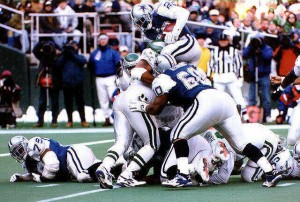
Emmitt Smith had the Cowboys flying early as he scored a first half touchdown and rushed for 108 yards.
Following Brown’s interception, the Eagles would drive down the field to get a field goal from Anderson, a 27-yarder that cut the Cowboys’ lead to 17-6 at halftime.
During the halftime intermission, the Eagles coaching staff made an adjustment to help stop Smith who gained 98 yards on 18 carries in the first 30 minutes.
In the second half, one of the Eagles linebackers would line up closer to the line of scrimmage on every play.
The tactic worked as Smith would only gain 10 yards on nine carries in the second half as the Eagles defense held the Cowboys to just 47 yards of total offense in the second 30 minutes.
Late in the third quarter, the Eagles would took advantage of a short field to travel 46 yards in 11 plays, ending with a 1-yard touchdown run by Watters, which was followed by a successful two-point conversion as Peete completed a pass to Fred Barnett to cut it to 17-14 with 44 seconds left in the third quarter.
Philadelphia’s momentum appeared to come to a halt early in the fourth quarter when Peete lost a fumble that was recovered by the Cowboys at the Eagles’ 15-yard line, giving Dallas a prime opportunity to put the game away.
But on first-and-goal from the five-yard-line, Eagles linebacker Kurt Gouveia caused a fumble when his helmet jarred the ball loose from Smith, which was recovered by Eagles strong safety Mike Zordich at the two-yard-line.
Both teams would punt on their ensuing possessions when the Eagles got the ball back at their 38-yard-line where they put together an 11-play, 41-yard drive that culminated with a 38-yard field goal by Anderson that tied the game at 17 with 2:53 to play in regulation.
The Cowboys started their next possession at the 20-yard-line and got nine yards on the first two plays of the drive.
Smith was stopped short of the first on third-and-one, presumably forcing a punt from the Cowboys.
But Switzer decided to gamble and go for the first down, even though the Eagles would already be in field goal range if the Cowboys were stopped.
For the play, Switzer called “Load Left”, what Cowboys tackle Nate Newton called their bread-and-butter play where Smith would run past the overloaded left side of the line after they pulverized the opposing defensive line.
Smith took the handoff from Aikman and ran to the left side of the line, only to be stopped by several Eagle defenders which included Bill Romanwski.
But as the Eagles started to celebrate their defensive stop, the referees ran in to whistle the play dead, saying that the clock struck 2:00 for the two-minute warning before the ball was snapped, nullifying the play and giving Dallas another chance to play it safe and punt the ball.
However, Switzer stuck to his guns and told the offense to go ball on the field and go for the first down, by running the same exact play that was stopped before, “Load Left”.
Once again, Smith took the handoff from Aikman and ran to the left side of the line, and once again he was met by a herd of Eagle defenders, stopping him short of the first down.
The second stop counted, and the Eagles took over at downs at the Eagles’ 29-yard-line.
Watters carried it three straight times, gaining four yards, setting up a 42-yard field goal for Anderson that would give the Eagles the lead.
Anderson made the kick but once again referees nullified a successful Eagles play, because the referees had not signaled for the play to start, which meant that Anderson had to make the kick for the second time.
Much like the defensive stand, Anderson’s second attempt was successful and the second try counted, as the Eagles took a 20-17 lead with 1:26 left in the game.
After the field goal, the Cowboys were unable to mount a drive to tie and take the lead as Aikman only completed two of 10 passes and was sacked by defensive tackle William Fuller on the final play of the game, giving Philadelphia a 20-17 victory, their first win over the Cowboys.
In the postgame press conference, Switzer cited that because the Cowboys would be punting into a brisk wind, the Eagles would get great field position and able to run out the clock before attempting a game-winning field goal.
But Switzer’s reasoning did not seem efficient to members of the media as Switzer was brutally criticized for his decision to go for fourth down in his own territory with the game tied.
Some suggested that Switzer be fired, but owner Jerry Jones came out and said that Switzer would remain as coach of the Cowboys.
Dallas would win their last two games of the regular season to finish with a 12-4 record and clinch home field advantage throughout the playoffs.
In the divisional round, the Cowboys faced the Eagles, who defeated the Detroit Lions 58-37 in their Wild Card game.
This time, there was no need for the Cowboys to make a 4th down in the final minutes as Dallas easily beat the Eagles 30-11.
The Cowboys would go on to defeat the Pittsburgh Steelers 27-17 in Super Bowl XXX for the team’s third Super Bowl title in four years, but first under the helm of Switzer.
Switzer would coach the Cowboys for two more seasons until he was fired after a 6-10 season in 1997.
Along with Jimmy Johnson, Switzer is the only head coach to win a national championship and a Super Bowl.
